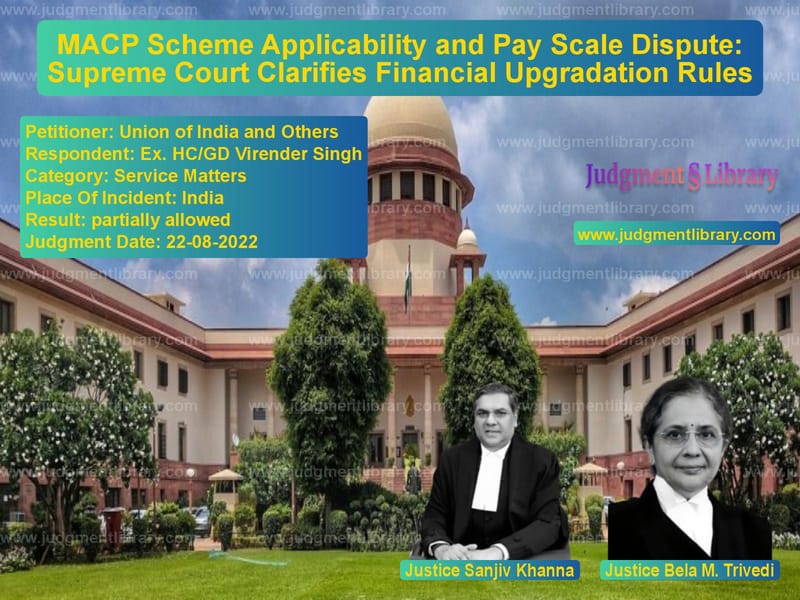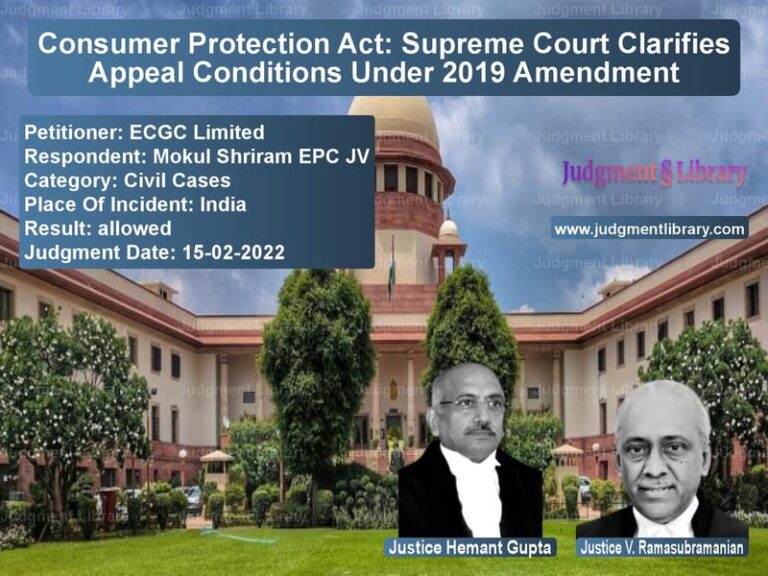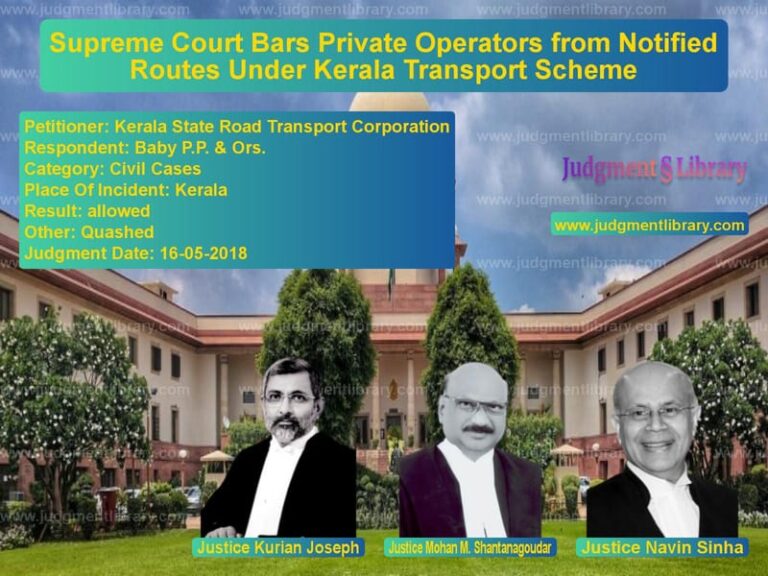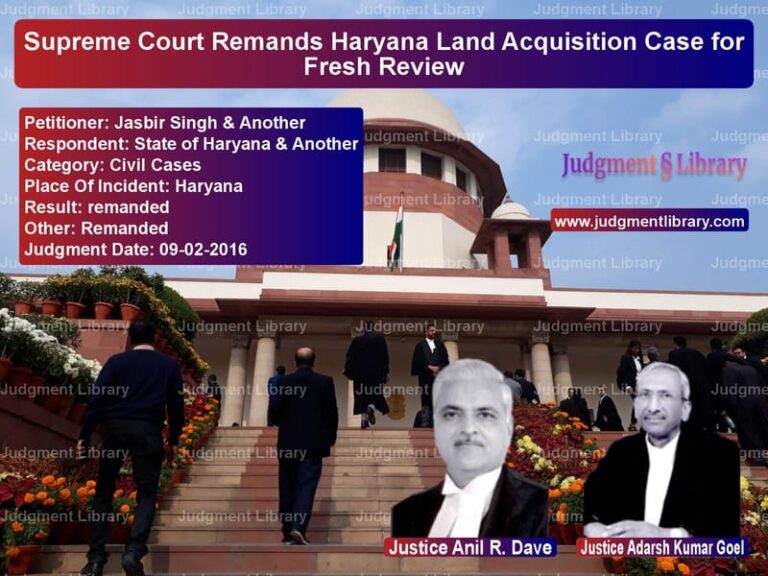MACP Scheme Applicability and Pay Scale Dispute: Supreme Court Clarifies Financial Upgradation Rules
The case of Union of India and Others vs. Ex. HC/GD Virender Singh revolved around the interpretation and applicability of the Modified Assured Career Progression (MACP) Scheme, particularly regarding its effective date and the nature of financial upgradation granted under the scheme. The Supreme Court was tasked with resolving three key issues: (a) whether the MACP Scheme was applicable from January 1, 2006, or September 1, 2008; (b) whether financial upgradation under the MACP Scheme should be to the next promotional post in the hierarchy or only to the immediate next grade pay; and (c) whether personnel from the Central Armed Police Forces (CAPF) should be granted financial upgradation under the MACP Scheme even if they could not fulfill pre-promotional course requirements due to administrative reasons.
Background of the Case
The dispute arose when the respondents, who were members of the Central Armed Police Forces (CAPF), claimed financial upgradation benefits under the MACP Scheme. They argued that the scheme should be implemented retrospectively from January 1, 2006, in line with the Central Civil Services (Revised Pay) Rules, 2008, rather than from September 1, 2008, as stated in the government notification. Additionally, they contended that financial upgradation should be granted to the pay scale of the next promotional post rather than merely the next grade pay.
The Union of India opposed these claims, asserting that the MACP Scheme was an incentive scheme distinct from regular promotions and should only apply from September 1, 2008, as explicitly stated in the government notification. The case also raised concerns about the financial implications of implementing the MACP Scheme retrospectively.
Arguments Presented
Petitioner (Union of India) Arguments
- The MACP Scheme was introduced as an incentive scheme to provide relief against stagnation and was not part of the regular pay structure.
- The scheme was intended to be applied prospectively from September 1, 2008, as per the Office Memorandum dated May 19, 2009.
- Allowing financial upgradation to the next promotional post rather than the next grade pay would create disparities between different departments and undermine the intended uniformity of the MACP Scheme.
- Implementing the scheme retrospectively from January 1, 2006, would result in significant financial burdens and create inconsistencies in pay structures.
Respondent (Ex. HC/GD Virender Singh and Others) Arguments
- The respondents argued that the MACP Scheme should be implemented from January 1, 2006, as the Central Civil Services (Revised Pay) Rules, 2008, were enforced from that date.
- They contended that financial upgradation under the MACP Scheme should be equivalent to the pay scale of the next promotional post, similar to the previous Assured Career Progression (ACP) Scheme.
- Personnel from the Central Armed Police Forces (CAPF) should not be denied financial upgradation simply because they could not complete pre-promotional courses due to administrative constraints.
Supreme Court’s Analysis and Judgment
The Supreme Court carefully analyzed the intent and implementation of the MACP Scheme, referencing earlier decisions such as Union of India vs. M.V. Mohanan Nair and Union of India vs. Balbir Singh Turn. The Court distinguished between the MACP Scheme and the ACP Scheme, emphasizing that MACP was designed to provide a uniform system of financial upgradation without linking it to promotions.
Key Observations by the Supreme Court
- The Court reaffirmed that the MACP Scheme was an incentive scheme rather than a part of the pay structure.
- It noted that the ACP Scheme provided financial upgradation to the next promotional post, but the MACP Scheme deliberately replaced this with a system granting upgradation to the immediate next grade pay.
- It emphasized that the MACP Scheme was implemented through the Office Memorandum dated May 19, 2009, which clearly stated that the scheme would take effect from September 1, 2008.
- The Court rejected claims for retrospective implementation from January 1, 2006, stating that such an approach would create administrative and financial complications.
Key Court Statement
“The MACP Scheme, being a part of the pay structure and having an impact on the grade pay of employees, cannot be considered an allowance. It was designed as an incentive scheme, applicable prospectively from September 1, 2008, to ensure uniformity and prevent disparities among different government departments.”
Final Judgment
- The Supreme Court ruled that the MACP Scheme applies from September 1, 2008, and not from January 1, 2006.
- The Court upheld that financial upgradation under the MACP Scheme should be to the immediate next grade pay in the hierarchy rather than the next promotional post.
- The Court ruled in favor of CAPF personnel, stating that they should be granted financial upgradation under the MACP Scheme even if they could not fulfill pre-promotional course requirements due to administrative reasons.
Conclusion
The Supreme Court’s ruling provides clarity on the scope and implementation of the MACP Scheme, reinforcing that it is an incentive-based program aimed at reducing stagnation rather than a part of the regular pay structure. The decision ensures uniformity across government departments and prevents financial and administrative complications. Importantly, the Court also protected the rights of CAPF personnel by allowing them to receive financial upgradation without mandatory pre-promotional course completion, acknowledging the unique challenges faced by defense and security personnel.
Petitioner Name: Union of India and Others.Respondent Name: Ex. HC/GD Virender Singh.Judgment By: Justice Sanjiv Khanna, Justice Bela M. Trivedi.Place Of Incident: India.Judgment Date: 22-08-2022.
Don’t miss out on the full details! Download the complete judgment in PDF format below and gain valuable insights instantly!
Download Judgment: union-of-india-and-o-vs-ex.-hcgd-virender-s-supreme-court-of-india-judgment-dated-22-08-2022.pdf
Directly Download Judgment: Directly download this Judgment
See all petitions in Employment Disputes
See all petitions in Promotion Cases
See all petitions in Pension and Gratuity
See all petitions in Recruitment Policies
See all petitions in Public Sector Employees
See all petitions in Judgment by Sanjiv Khanna
See all petitions in Judgment by Bela M. Trivedi
See all petitions in partially allowed
See all petitions in supreme court of India judgments August 2022
See all petitions in 2022 judgments
See all posts in Service Matters Category
See all allowed petitions in Service Matters Category
See all Dismissed petitions in Service Matters Category
See all partially allowed petitions in Service Matters Category







